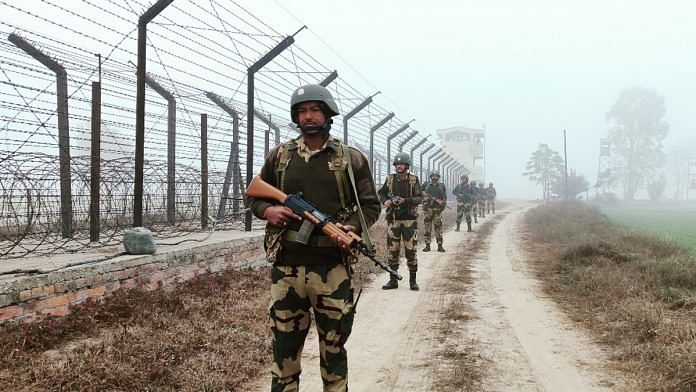New Delhi: The Supreme Court Monday framed six questions which it will look into regarding the Punjab government’s plea challenging the Centre’s notice to extend control of the Border Security Force (BSF) in the border states.
In October 2021, the Centre had released a notification extending the “jurisdiction” (area under control) of the BSF from 15 km to 50 km from the international border in Gujarat, Rajasthan, Punjab, West Bengal and Assam.
Following the notification, Punjab moved the top court in December, contending that extending the area under control of the BSF was a “direct attack on federalism”.
While Punjab claimed that it was a violation of the federal structure and the Border Security Force Act, 1968, the Centre has claimed that the notification is within its powers to protect border areas.
In December, the Supreme Court directed the parties to file their version of proposed issues that needed to be decided. In response, both parties had submitted their lists, with the Centre’s record including the scope of judicial review over jurisdiction of armed forces and whether all states should be treated alike in such cases.
The bench headed by Chief Justice of India D.Y. Chandrachud, also comprising Justices J.B. Pardiwala and Manoj Mishra, will decide on the issue whether the notification extending the BSF area of control to 50 km is an ‘arbitrary’ and ‘unconstitutional’ exercise of power of the central government and whether it is ‘beyond the local limits’ of the border area, as provided under the BSF Act.
The bench will also decide on the factors that are required to be considered for such extension of boundaries, whether all states should be treated alike to decide on extensions, and whether the notification could at all be challenged before the court.
ThePrint explains the dispute that has reached the apex court.
Also Read: Ghaziabad to get new name? What law says about renaming of cities and states in India
BSF Act & Centre’s powers
Raised in 1965, the BSF is one of the five central armed police forces in India. Often called the first line of defence of Indian territories, the over two-lakh-strong force is now the world’s largest border guarding force securing the 6,386.36 km long International Border with Pakistan and Bangladesh.
Under Section 139 of the Act, the central government is empowered to extend the area of operation of the force by an order. “The central government may, by general or special order published in the Official Gazette direct that, subject to such conditions and limitations, and within the local limits of such areas adjoining the borders of India, as may be specified in the order…,” it states.
This section allows the Centre to empower BSF members to exercise powers in such border areas by an order of the government.
Solicitor General Tushar Mehta traces the powers to issue such a notification to Section 139 itself. Since the power to extend areas to “local limits” is provided by the Act, the extension is valid, he argued.
On the other hand, Shadan Farasat, Additional Advocate General of Punjab, says that Section 139 cannot be used to justify the move. The BSF Act doesn’t give unilateral power to the Centre to extend into areas which don’t touch the border and it cannot fill under the ambit of “local areas”, he said.
State & Central lists
Notably, the Seventh Schedule of the Constitution provides three lists — a Union List (List I), a State List (List II), and a Concurrent List (List III). This division provides respective powers of the Centre and the State to legislate on specific subjects and forms the backbone of the federal structure.
Punjab claims that the extension notification violates the structure provided under the Seventh Schedule, as the power to the BSF affects the state’s power over ‘public order’ and ‘police’. Public order and police form a part of the State List, meaning that the state (in this case, Punjab) has power to make law on these subjects.
But, the Centre argues that this is an issue of the defence of India, armed forces, and the deployment of armed forces, a part of the Union List.
Notably, the BSF was raised after Pakistan attacked posts at Kutch, which was guarded by the then state battalion. The Centre came up with the BSF with the need for a specialised centrally controlled border force.
This contention will also be decided by the SC by a pronouncement on whether the notification is an “unconstitutional” encroachment on the powers of the state. If it agrees that this is a matter under the State List, the move could be adjudged ‘unconstitutional’.
Standard distance & crime prevention
Mehta asserts that the government’s endeavour was only to maintain consistency across states as to the distance of application where the BSF can exercise powers. He cited the example of Gujarat, where the government had reduced the area under the BSF to 50km (from 80 km).
Punjab argues that given its small size, the 50 km radius will be a clear encroachment of state powers extending even to the capital. This is not the case in bigger states like Gujarat, it contends.
The Centre also argues that to prevent trans-border crimes, it is necessary that the BSF get such powers in interior areas which would otherwise be under the state.
The top court, meanwhile, will also take a call on whether it can under Article 131 of the Constitution decide the challenge under the notification. Article 131 provides for the ‘original jurisdiction’ of the SC, vesting powers to decide disputes concerning the federal structure.
Akshat Jain is a student of the National Law University, Delhi, and an intern with ThePrint.
(Edited by Tony Rai)
Also Read: Is AMU a minority institution? Roots of 6-decade-old dispute & why it’s come up in SC again



